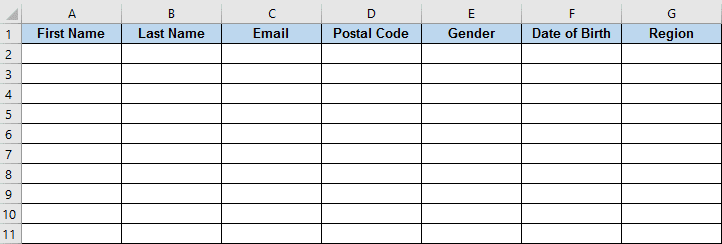Managing Email Marketing Campaigns With Excel
This page may contain links to Amazon.com or other sites from which I may receive commission on purchases you make after clicking on such links. Read my full Disclosure Policy

For most people I know, email marketing looks something like this:
Signed up for an email service? Check.
Opt-in form added to website? Check.
List segmented so you can target messages to specific subscribers? Wait, what?
If you’ve heard that you need to be doing this but have no idea how to start, you’re going to love this post from Angela Nino!

Regardless of whether you’re a new or an established business, it’s important to build and maintain your email list. It’s a powerful marketing tool that enables you to directly reach your customers, and approximately 75% of companies agree that email offers “excellent” to “good” ROI.
Organization is key to successful email marketing campaigns. Email marketing platforms like Mailchimp are great, but it helps to use tools like Microsoft Excel to map out your email marketing plan.
Here are some handy tips and tricks to help get your email list in shape!
Email Personalization
First things first, who are you emailing? Most businesses already have at least some information for their customers. If not, now’s the time to start gathering that data. You’ll absolutely want to collect the basics, like name, postal code, and email address. You may also want to collect insights about their gender, age, and birthday.
Once you’ve gathered this data, it’s time to organize it. A simple format will do the trick, and will make your ongoing marketing efforts a breeze. It will also make it easy to import your list to an email CRM.
Here’s an example of what that could look like:

Audience Segmentation
Chances are, your business has a variety of customers with many different interests. It would make sense, then, that they’re not all interested in getting the same marketing emails from you.
For example, if your business is a concert venue, you probably have customers who love one style of music but have absolutely no interest in another. If you’ve been keeping good tabs on their preferences and purchase history, you can sort your existing Excel list, quickly pulling subgroups of customers who enjoy a specific genre.
A/B Testing Email Variations
Now that you have your contacts segmented out, it’s time to write some emails. But how do you know what types of messages your customers will respond to?
Sounds like it’s time to run some tests!
Many email providers will allow you to A/B test subject lines, send times, content, and more. However, if you don’t use email marketing software, you can run manual tests through your inbox.
You can use Excel to organize your tests. Just be sure to only test one thing at a time so you know what’s actually working!
Here’s an example of what that spreadsheet could look like:

Tracking Your Successes
If you want to know what really works, you need to measure your results. The first step to measuring your results is knowing what a success looks like to you. Here are some common KPIs for email marketing:
- Replies: This is probably the easiest to track. Even if the response wasn’t exactly what you were looking for, you can at least make the assumption that your subject line was enticing enough to be viewed.
- Conversions: If you don’t have tracking codes enabled this could be difficult. For those of you running ecommerce email marketing out of your inbox, try including a different discount code for your test campaigns so you can gauge success.
- Opens: If you’re sending email marketing campaigns through your inbox, seeing if your email was opened isn’t possible without a little help. There are plugins and other tools that enable you to track opens directly from your inbox, including ContactMonkey, Mail Track, Bananatag, and Gmelius.
By staying organized in your email marketing efforts, you don’t just earn results, you also secure quality customers. Regardless of whether or not you use email marketing software, having the flexibility to manually manage and plan ongoing strategy with Excel will help you yield results year after year.




This is very helpful information. I use Excel often so using it for tracking testing for my email marketing campaign is a easy fit. I am going to try it. Thanks for the guidance.
I use Excel for a lot of things too – it’s a great way to manage information.
I love data and sorting what I’ve got in different ways. Information about your client base is power, and in today’s market, most businesses are able to target and understand their client in a very specific way. I am still not sure how effective email marketing will be in the future, but if you are using it, use it wisely! Great to see you here on Janet’s blog, Angela.
I haven’t seen any indications that email marketing is declining. Have you?
Great article. Further proof I need to learn excel. Lol
The list of plugins has gone on my review list – I totally needed this, THANKS!
You definitely should! There are loads of free online resources for learning it, too.
I also use Excel to make it easy to use for monitoring testing for my email marketing campaign. I’ve gathered some valuable knowledge from this article. The article is well explained and easy to understand. Thank you for sharing this important knowledge with us. Keep a good job.
This is extremely useful information. I frequently use Excel, so using it for monitoring testing for my email marketing campaign is a good fit. I’m going to give it a shot. Thanks a lot.
I too use Excel for a lot of things as well; it’s an excellent method to keep tracking of data.
Thrilled to see such a well-structured email marketing plan guide! It breaks down strategy formulation, content optimization, and execution into clear, actionable steps that any business can implement for measurable success!